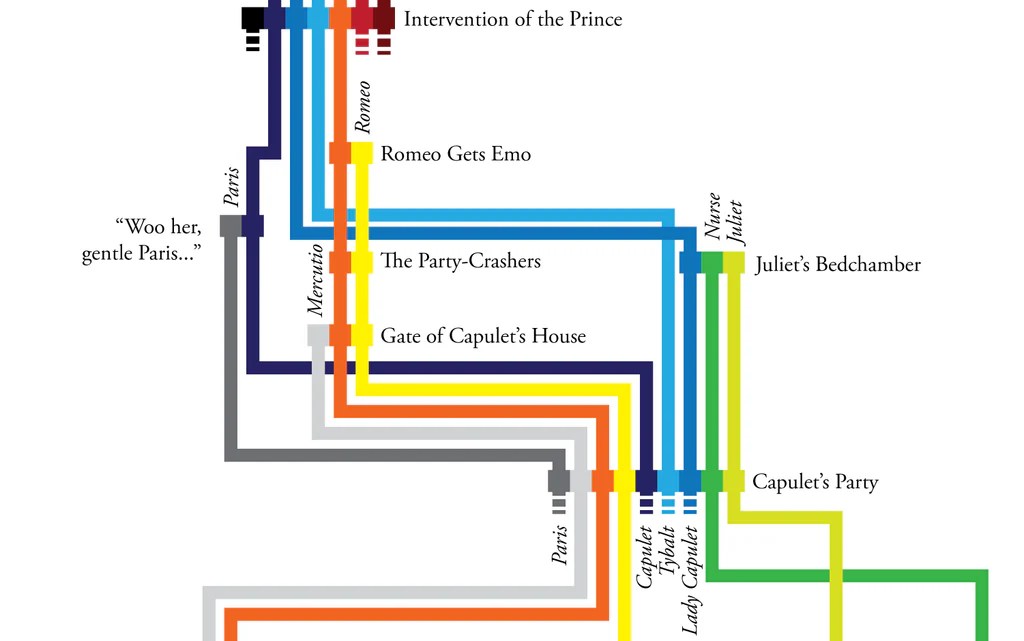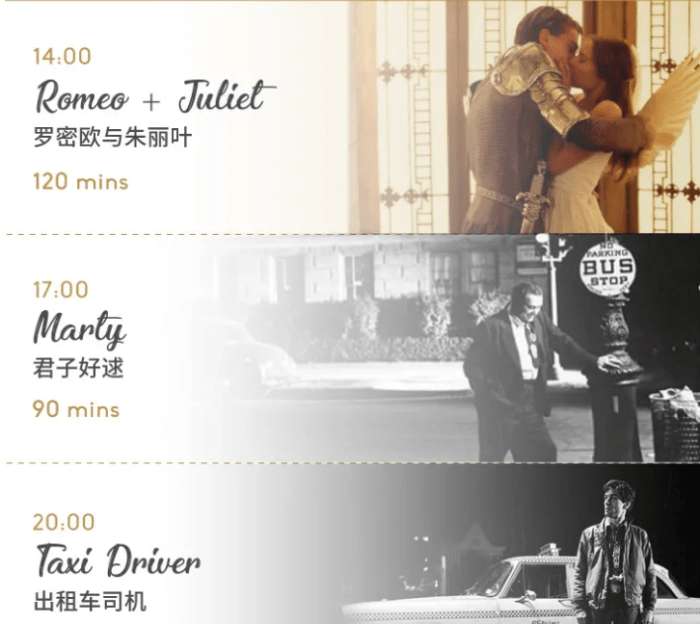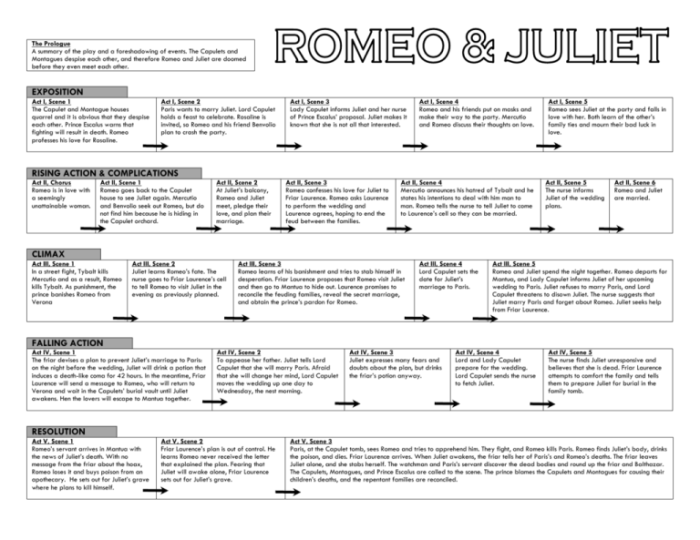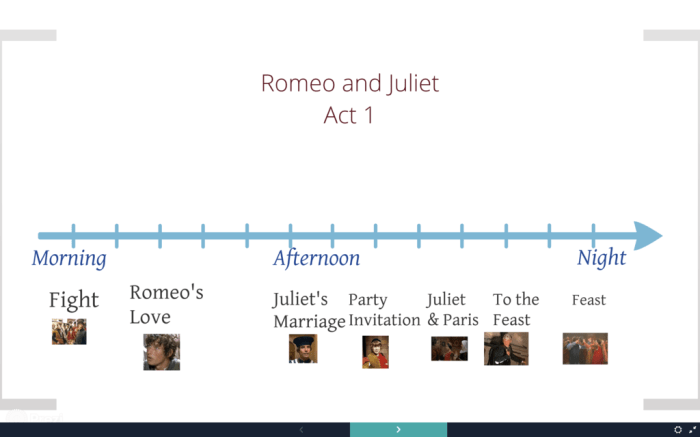Plot driver in romeo and juliet – In the timeless tale of Romeo and Juliet, a whirlwind romance blossoms amidst a bitter feud, setting the stage for a heart-wrenching tragedy. The plot of this iconic play is driven by a complex interplay of forces, both external and internal, that shape the destiny of its star-crossed lovers.
From the societal pressures that constrain their choices to the fateful events that ultimately lead to their demise, we delve into the intricate plot drivers that propel Romeo and Juliet’s story towards its inevitable conclusion.
Love and Hate: Plot Driver In Romeo And Juliet

The bitter feud between the Montagues and Capulets plays a pivotal role in the tragic love story of Romeo and Juliet. This longstanding rivalry creates insurmountable obstacles for the young lovers, setting the stage for their ultimate downfall.
Escalation of the Feud
The feud between the two families is a cycle of violence and retaliation. Each act of aggression fuels further animosity, escalating the conflict to a point of no return. Notable incidents that escalate the feud include:
- The street brawl in Act I, Scene 1, which results in the deaths of Tybalt and Mercutio.
- Romeo’s banishment from Verona for killing Tybalt.
- The Capulets’ plot to marry Juliet to Paris, despite her love for Romeo.
- Romeo’s fatal decision to drink the poison, believing Juliet to be dead.
- Juliet’s suicide upon discovering Romeo’s lifeless body.
These tragic events highlight the devastating consequences of the feud, which ultimately destroys the lives of Romeo and Juliet and brings grief to both families.
Fate and Free Will

Fate plays a significant role in the tragic relationship of Romeo and Juliet. The play suggests that their destiny is predetermined, and they are powerless to alter it. However, it also presents evidence that Romeo and Juliet have some degree of control over their actions, and their choices contribute to their ultimate downfall.
The conflict between the Montagues and Capulets drives the plot of Romeo and Juliet, leading to a series of tragic events. Like the power struggle between these families, addiction can also fuel conflict and drive individuals towards destructive actions. To gain a deeper understanding of the consequences of addiction, you may find the chapter 5 aa big book summary insightful.
This chapter explores the impact of addiction on individuals and their relationships, offering valuable insights that can help us comprehend the plot drivers in Romeo and Juliet and other literary works that explore the themes of conflict and addiction.
Romeo and Juliet’s Destiny
The play is filled with foreshadowing and prophecies that hint at the tragic fate of the lovers. The prologue declares that they are “star-crossed” and destined to die. The Friar’s warning that their love will end in “disaster” also foreshadows their tragic end.
These prophecies create a sense of inevitability and suggest that Romeo and Juliet’s fate is out of their hands.
Romeo and Juliet’s Choices
Despite the prophecies, Romeo and Juliet do have some control over their actions. They choose to defy their families and marry in secret. They also choose to take their own lives rather than live without each other. These choices contribute to their tragic end, but they also demonstrate that they have some agency in their own destiny.
Conclusion
The role of fate and free will in Romeo and Juliet is complex and ambiguous. The play suggests that both fate and free will play a role in the lovers’ tragic destiny. However, it is ultimately up to the audience to decide which force they believe is more powerful.
Social and Cultural Context
In Verona, the setting of Romeo and Juliet, social and cultural norms dictated many aspects of daily life. These norms, deeply ingrained in the characters, significantly influenced their decisions and shaped the tragic events of the play.
Social Hierarchy
Verona’s society was rigidly stratified, with the Montagues and Capulets as prominent aristocratic families. This social hierarchy defined the characters’ status, expectations, and interactions. The Montagues and Capulets held an intense rivalry, forbidding any romantic relationships between their members.
Family Honor
Family honor was paramount in Veronese society. Any perceived insult or threat to a family’s reputation demanded swift retribution. This cultural value fueled the feud between the Montagues and Capulets and prevented any reconciliation.
Arranged Marriages
Arranged marriages were common in Verona. Families often negotiated unions for their children to strengthen alliances and secure financial stability. Juliet’s parents planned to marry her to Paris, a wealthy and eligible suitor, without her consent.
Role of Societal Pressure
Societal pressure played a significant role in Romeo and Juliet’s tragedy. The expectations of their families and the norms of their society constrained their choices and limited their ability to act freely. Romeo and Juliet’s defiance of these norms, ultimately leading to their downfall, highlights the power of societal pressure.
Character Development

Romeo and Juliet undergo significant character development throughout the play, influenced by their experiences, relationships, and choices. Initially, Romeo is a romantic and idealistic youth, while Juliet is a young and innocent girl. However, as their love deepens and they face challenges, both characters mature and evolve.
Romeo’s Character Development
Romeo’s character undergoes a significant transformation throughout the play. Initially, he is portrayed as a lovesick and impulsive young man, prone to emotional outbursts and hasty decisions. However, after meeting Juliet, he becomes more responsible and thoughtful. His love for her challenges him to grow up and confront the obstacles that stand in their way.
Romeo’s experiences with Tybalt and Mercutio also shape his character. Tybalt’s death forces him to confront the consequences of his actions, while Mercutio’s death makes him realize the fragility of life. These experiences lead Romeo to become more cautious and reflective, and he ultimately chooses to die with Juliet rather than live without her.
Juliet’s Character Development
Juliet’s character also undergoes significant growth and development throughout the play. Initially, she is portrayed as a naive and obedient young girl, but she quickly matures into a strong and independent woman. Her love for Romeo challenges her to defy her family and society’s expectations.
Juliet’s experiences with the Nurse and Friar Laurence also shape her character. The Nurse provides Juliet with support and guidance, while Friar Laurence helps her to develop her own moral compass. These experiences help Juliet to become more confident and self-reliant, and she ultimately chooses to take her own life rather than marry Paris.
Symbolism and Imagery

Shakespeare employs a rich tapestry of symbolism and imagery in Romeo and Juliet to enhance the play’s themes and create a vivid atmosphere. These elements serve as literary devices that deepen the understanding of the characters, their motivations, and the tragic events that unfold.
The Power of Love
- Light and Darkness:Light symbolizes love and hope, while darkness represents hatred and despair. Romeo and Juliet’s love is often depicted as a radiant light that illuminates their world, while the forces that oppose them are shrouded in darkness.
- The Rose:The rose is a traditional symbol of love, beauty, and passion. It is associated with both Romeo and Juliet, representing the intense and all-consuming nature of their love.
- The Balcony:The balcony serves as a symbol of the secret and forbidden nature of Romeo and Juliet’s love. It is where they first meet and share their vows, but it also foreshadows the tragic events that will follow.
Fate and Free Will, Plot driver in romeo and juliet
- The Stars:The stars are often mentioned in the play, representing fate and destiny. The characters believe that their lives are predetermined by the stars, and this belief shapes their actions and decisions.
- The Apothecary:The apothecary represents the power of fate. He provides Romeo with the poison that ultimately leads to his and Juliet’s deaths, fulfilling the prophecy of their tragic end.
- The Nurse:The nurse serves as a symbol of free will. She tries to guide Romeo and Juliet and prevent their tragic end, but her efforts are ultimately futile, demonstrating the limits of human agency in the face of fate.
Social and Cultural Context
- The Sword:The sword is a symbol of violence and aggression. It is used to represent the ongoing feud between the Montagues and Capulets, which ultimately leads to the deaths of Romeo and Juliet.
- The Poison:The poison is a symbol of the destructive forces that can destroy even the most beautiful and passionate love. It represents the social and cultural pressures that prevent Romeo and Juliet from being together.
- The Friar’s Cell:The friar’s cell is a symbol of hope and sanctuary. It is where Romeo and Juliet go to be married, and it is also where they plan their escape from their feuding families.
Character Development
- Romeo:Romeo is associated with the sun and light, representing his passionate and idealistic nature. However, his impulsive actions and quick temper also lead to his downfall.
- Juliet:Juliet is associated with the moon and stars, representing her beauty, purity, and innocence. However, she is also capable of great strength and determination, as seen in her willingness to defy her family for love.
- Mercutio:Mercutio is a symbol of vitality and exuberance. He represents the joy and freedom that Romeo and Juliet find in each other’s company, but his death foreshadows the tragic events that will follow.
Themes

Romeo and Juliet explores several profound themes that resonate with audiences across time and cultures.
These themes are woven into the play’s characters, plot, and setting, and they contribute to its enduring relevance and significance.
Love and Hate
- Love: The play’s central theme is the transformative and destructive power of love. Romeo and Juliet’s love is intense, passionate, and ultimately doomed.
- Hate: The play also explores the destructive force of hate and prejudice, particularly through the feud between the Montagues and Capulets.
Fate and Free Will, Plot driver in romeo and juliet
- Fate: The play raises questions about the role of fate in human affairs. The characters’ actions and decisions seem to be predetermined by a tragic destiny.
- Free Will: Despite the seemingly inexorable forces of fate, the characters also exercise their own free will. Their choices and actions contribute to the play’s tragic outcome.
Social and Cultural Context
- Societal Norms: The play reflects the strict social and cultural norms of Elizabethan England. These norms govern the characters’ behavior and shape their relationships.
- Family Honor: Family honor is a central value in the play. The Montagues and Capulets prioritize their family’s reputation over the happiness of their children.
Character Development
- Romeo’s Transformation: Romeo undergoes a significant transformation throughout the play. He matures from a naive and impulsive youth to a passionate and courageous lover.
- Juliet’s Growth: Juliet also experiences significant growth. She evolves from a sheltered and obedient daughter to a strong and determined young woman.
Symbolism and Imagery
- Light and Darkness: Light and darkness are recurring symbols in the play. Light represents hope and love, while darkness represents despair and tragedy.
- The Balcony Scene: The famous balcony scene is a powerful symbol of Romeo and Juliet’s love. It is a moment of stolen intimacy and passion.
FAQ
What is the significance of the feud between the Montagues and Capulets?
The feud creates an insurmountable obstacle for Romeo and Juliet’s love, as it prohibits them from being together openly and forces them to keep their relationship a secret.
To what extent do Romeo and Juliet have control over their destiny?
While fate plays a significant role in their story, Romeo and Juliet’s choices also contribute to their tragic outcome. Their impulsive actions and failure to consider the consequences of their decisions ultimately lead to their downfall.
How does societal pressure influence Romeo and Juliet’s decisions?
The societal norms of their time, which emphasize family honor and obedience, place immense pressure on Romeo and Juliet. These norms make it difficult for them to defy their families and pursue their love.